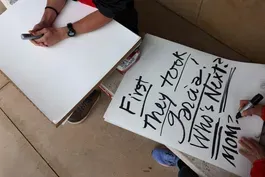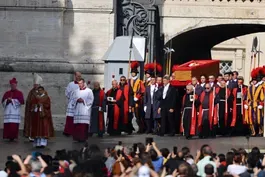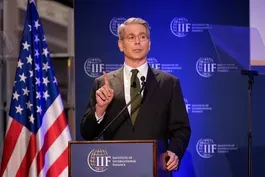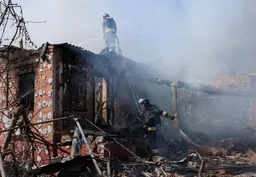
Springfield and its migrants still dealing with spotlight
Clip: 4/23/2025 | 9m 22sVideo has Closed Captions
How Springfield and its Haitian immigrants are still dealing with election’s spotlight
During the campaign, Springfield, Ohio, became a flashpoint in the national conversation when Donald Trump and JD Vance amplified false rumors that Haitian immigrants were abducting and eating pets. Months later, Springfield is reckoning with its turn in the spotlight as its Haitian migrants face the threat of deportation. Judy Woodruff visited the town for her series, America at a Crossroads.
Problems with Closed Captions? Closed Captioning Feedback
Problems with Closed Captions? Closed Captioning Feedback
Major corporate funding for the PBS News Hour is provided by BDO, BNSF, Consumer Cellular, American Cruise Lines, and Raymond James. Funding for the PBS NewsHour Weekend is provided by...

Springfield and its migrants still dealing with spotlight
Clip: 4/23/2025 | 9m 22sVideo has Closed Captions
During the campaign, Springfield, Ohio, became a flashpoint in the national conversation when Donald Trump and JD Vance amplified false rumors that Haitian immigrants were abducting and eating pets. Months later, Springfield is reckoning with its turn in the spotlight as its Haitian migrants face the threat of deportation. Judy Woodruff visited the town for her series, America at a Crossroads.
Problems with Closed Captions? Closed Captioning Feedback
How to Watch PBS News Hour
PBS News Hour is available to stream on pbs.org and the free PBS App, available on iPhone, Apple TV, Android TV, Android smartphones, Amazon Fire TV, Amazon Fire Tablet, Roku, Samsung Smart TV, and Vizio.
Providing Support for PBS.org
Learn Moreabout PBS online sponsorshipGEOFF BENNETT: Last September, the small city of Springfield, Ohio, became a flash point in the national conversation around immigration, when then-vice presidential candidate J.D.
Vance amplified a lie, that Haitian immigrants there were abducting and eating pets, which was then repeated by President Trump during the presidential debate.
Months later, Springfield is still reckoning with its turn in the spotlight.
Judy Woodruff visits the city as part of her ongoing series America at a Crossroads.
LUCKENS MERZIUS, Resident of Springfield, Ohio: Hi.
My name is Luckens Merzius.
JUDY WOODRUFF: At his local public radio station, WYSO, Luckens Merzius is getting the chance to tell his own story as a Haitian resident of Springfield, Ohio, after months of his community being in the national spotlight.
LUCKENS MERZIUS: When you share your stories, you share your experiences, you can make a difference.
People can listen and understand what you have been through.
And every single time I had a conversation with Marley, she said, "Dad, when you come to pick me up?"
JUDY WOODRUFF: His contribution to the series "Haitians in the Heartland" is a personal one about one of his two daughters who was then living in Haiti reuniting with his family in Springfield.
Haiti is currently in the grips of a worsening humanitarian crisis.
LUCKENS MERZIUS: It was great to see my daughter come to the United States.
JUDY WOODRUFF: That was pretty special.
LUCKENS MERZIUS: It's just about, like, hope, love and faith.
ANNOUNCER: The ABC News presidential debate.
JUDY WOODRUFF: It's a story in stark contrast to how his community was portrayed during the last two months of the presidential election.
DONALD TRUMP, President of the United States: In Springfield, they're eating the dogs, the people that came in.
They're eating the cats.
JUDY WOODRUFF: When President Trump repeated false rumors on the debate stage to an audience of nearly 70 million people.
How did you even think about how to respond to that?
LUCKENS MERZIUS: Ignorance and hate doesn't care about the truth.
They don't care about what you're doing great because they find a way to talk down about you.
MAN: People talked about their dogs being stolen and eaten.
JUDY WOODRUFF: Despite no evidence to back up the allegations, the rumors took on a life of their own on social media.
ROB RUE, Mayor of Springfield, Ohio: For me, it was basically being in the middle of a hurricane that was swirling.
JUDY WOODRUFF: Rob Rue is Springfield's mayor.
ROB RUE: For I would say a good two weeks, I was in response mode.
The whole focus during that time for me was to present Springfield in the light that it wasn't being presented at a national level.
JUDY WOODRUFF: The national attention also attracted hate groups and threats of violence.
WOMAN: Authorities with the city of Springfield are responding to bomb threats.
JUDY WOODRUFF: Last fall, at least 33 bomb threats were made against city hospitals, schools, private residences and businesses, causing multiple evacuations.
Whom or what do you hold responsible for getting to that point?
ROB RUE: Those that have a national spotlight, a national microphone and choose to use words that could harm individuals, communities, those are the people that were responsible for bringing such a negative effect on our community.
JUDY WOODRUFF: President Trump has continued to paint Springfield in a negative light, calling the city destroyed in his address to Congress just last month.
ROB RUE: The president needs to know that we are not a destroyed community.
Springfield was used in a way to bring a light to a problem that I thought was a problem.
I have said before, I will say this, immigration reform needs to happen, but things were taken out of context.
People were hurt.
People were emotionally damaged.
The community was emotionally damaged, divided.
DIANA DANIELS, Resident of Springfield, Ohio: What happened to put a target on the smallish Midwest town to be the happy recipient of a horde of migrants?
We weren't being listened to.
We were force-fed.
It has enough of a large town vibe.
JUDY WOODRUFF: Diana Daniels has lived in Springfield for nearly 40 years and has been a fixture at city commission meetings, railing against the issues she says are caused by the Haitian immigrants.
DIANA DANIELS: It has completely changed this town.
I can't ride my bike anymore in town.
I don't dare.
I change how I drive, so that I know that I would not be killed by a driver who just got their driver's license.
It's harder to get into the hospital.
It's harder to get into a doctor.
If you need to get into jobs and family services, the line is out the door.
The way things are set up is, everything revolves around the Haitians.
JUDY WOODRUFF: Daniels has continued to be a presence at city commission meetings, which got especially heated during the run-up to the presidential election.
DIANA DANIELS: We have just brought two main daggone people to come in here and be able to apply for free stuff.
MAN: And I want to know, why are these people being coddled and pampered and giving this beautiful life, a life better than I live?
MARIAN STEWART, Volunteer, Springfield Neighbors United: Everybody in town said, whoa, what's going on here?
People spoke their mind.
And I think a lot of people, the predominant voice, if you will, was one of, we don't like our neighbors.
JUDY WOODRUFF: Marian Stewart is a retired minister who lives in a neighboring city.
She's a volunteer with a faith-based effort called Springfield Neighbors United.
Its goal is to support the region's immigrant community and encourage new voices to speak up.
WOMAN: I would like to see that the same kinds of opportunities given to my family are offered to others that come here.
Sometimes, the voices that come from the heart of caring and seeing our neighbors as our neighbors, that voice isn't necessarily the loudest.
MAN: I am so thankful for this room here, for the diversity in this room, for the diversity of this community.
MARIAN STEWART: We put our thinking caps on and came up with, we should go back to a basic core message that resonates with everyone.
Love your neighbor.
The commandment is love your neighbor as yourself.
JUDY WOODRUFF: A message now seen around town on billboards, T-shirts and banners outside city hall.
And have you seen examples of shifting, people who were originally skeptical or outright critical of these Haitian immigrants who are now coming around?
MARIAN STEWART: I see two things happening.
One is a hardening of opinion, because that's kind of -- we're bifurcated as a nation right now and that shows up locally as well.
But there's also -- there are people who understand, wait a minute, there's a fabric of Springfield now.
Springfield has a very diverse population.
Can we celebrate that?
DIANA DANIELS: Springfield United -- Neighbors United, that's your country club crowd.
Those are the people that don't have to deal with somebody from another culture on a daily basis.
Don't tell me that I have to be their neighbor, because that's what these folks are doing.
ROB RUE: There's always going to be folks that are going to be divisive.
My hope is that citizens would actually take a look at what really is good and work on the bad.
JUDY WOODRUFF: What do you think it would take to bring people together?
ROB RUE: People having conversations with individuals.
I mean, everybody's responsible for their own heart.
JUDY WOODRUFF: Diana Daniels says she has had those conversations, including about the very difficult journey and sacrifices many made to get here, that softened her thinking about Haitians as individuals.
DIANA DANIELS: I know a lot of Haitians.
I have several that live next to the store where I work.
I have had plenty of conversations, conversations that I wish I'd never had, because they're things I didn't want to know, but know now that has changed my perspective, pivoting away from being angry about an illegal being here to realizing that there were two sets of victims.
They are the victims just as well as we are.
JUDY WOODRUFF: In February, the temporary protected status that allows many of Springfield's Haitian immigrants to be in the U.S. legally was cut short by the Trump administration.
If the order stays in place, come August, many of the 10,000 to 15,000 Haitian residents of the city face deportation.
ROB RUE: We need some, well, commonsense thinking and policy for sure, because there are manufacturers that are going to not have second and third shift employees if, let's say, we have the largest mass deportation of individuals that are just here working hard and paying taxes.
JUDY WOODRUFF: Among those impacted will be Luckens Merzius and his family.
Do you have a plan for what you will do if your status ends?
LUCKENS MERZIUS: If I have to go back to my country, I go back to my country.
For myself, every day is a new chance and a new challenge.
JUDY WOODRUFF: Challenges ahead for him and the city he calls home.
For the "PBS News Hour," I'm Judy Woodruff in Springfield, Ohio.
American citizens wrongly detained in immigration crackdown
Video has Closed Captions
American citizens wrongly detained in Trump administration's immigration crackdown (5m 57s)
Democratic lawmakers visit students arrested by ICE
Video has Closed Captions
'Dignity is being compromised': Democratic lawmakers visit students arrested by ICE (6m 53s)
Mourners crowd Vatican to say farewell to Pope Francis
Video has Closed Captions
Mourners crowd Vatican to honor Pope Francis and say farewell (5m 9s)
News Wrap: U.S. and China see tariffs as unsustainable
Video has Closed Captions
News Wrap: Bessent says U.S. and China both see high tariffs as unsustainable (6m 14s)
Project lets people experience iconic places through sound
Video has Closed Captions
'Sonic Heritage' project lets people experience world's most iconic places through sound (5m 35s)
Tesla revenue falls sharply as Musk faces political backlash
Video has Closed Captions
Tesla revenue falls sharply as Musk faces political backlash (6m 16s)
What the U.S. proposed in latest Ukraine ceasefire talks
Video has Closed Captions
What the U.S. is offering and demanding in latest Ukraine ceasefire proposal (6m 3s)
Providing Support for PBS.org
Learn Moreabout PBS online sponsorshipSupport for PBS provided by:
Major corporate funding for the PBS News Hour is provided by BDO, BNSF, Consumer Cellular, American Cruise Lines, and Raymond James. Funding for the PBS NewsHour Weekend is provided by...


















